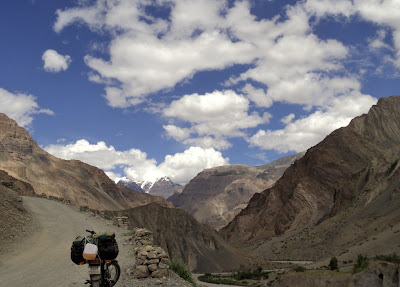The strike hit Darjeeling like a bad storm, shutting everything down and I had made it just in time. I knew that if I had arrived a few hours later I would not have found a room to rent. My landlord, though he allowed me to book in, obviously wanted me to either hide out in my room or leave. All the doors in Darjeeling, even the residential ones, were bolted shut. There was no way to get any food, water, internet or transport out of Darjeeling. I couldn’t even make a call. The day before I arrived in Darjeeling I had spent the last of my Delhi-airtime to phone my father on his 70th birthday (we got cut off just as we were both getting a little teary) and I decided that I would phone him again once I got to Darjeeling. I had given some money to Shallu and she topped me up whenever I needed airtime but now I couldn’t get a message to her and I realized that I was completely cut off. The worst was that during this strike Shallu’s birthday had come and gone and it broke my heart to know she was thinking that I had forgotten.
This strike was very different to the strikes I had witnessed in South Africa. There was no singing or dancing in the streets with the protestors noisily making their demands known. This was a passive but powerful rebellion. Luckily I did, on my first visit to Darjeeling, ask loads of questions and learnt enough about the political situation or I would have been thoroughly confused.
This is the story of the Gorkhas:
The Gorkhas were soldiers recruited from Nepal to join the English army. They were known as the ‘Gorkha Division’ and were recruited because they were exceptionally skilled soldiers. Their families also left Nepal and settled in Darjeeling which forms part of the West Bengal state and as I understand it, the Gorkhas feel that the West Bengal government have been oppressing them for 200 years and that they want to be an independent state and rename Darjeeling, Gorkhaland. I remember thinking at the time that I was all for their cause but that ‘Gorkhaland’ was a horrible name for such a beautiful place. Obviously the West Bengal government doesn’t want to lose Darjeeling because the tea industry is extremely profitable. But the Gorkhas were, clearly, not giving up and with our first visit, when the jeep dropped us in Darjeeling, we were at first lost because on every door was painted ‘Gorkhaland’ and on every available surface ‘welcome to Gorkhaland’. I even considered demanding that our driver take us all the way to Darjeeling and not just drop us in Gorkhaland.
But it was a different Darjeeling now and the atmosphere on the street was heavy and I could literally feel the tension. I managed to find a hotel owner who was willing to give me a bed without demanding that I stay indoors. He was not afraid of getting into trouble with the Gorkhas and answered all my strike-related questions. Whatever sympathy I felt for the Gorkhas and their cause disappeared. This was no democracy and if you didn’t close your door for the strike you would be forced or intimidated into doing so.
I was grateful to my brave landlord but was still hoping to find some food and spent hours stealthily skulking around the market hoping to find a shopkeeper who was brave enough to sell me something to eat but I was out of luck. This involuntary fast lasted for 3 days and I wasn’t exactly starving but I was very, very hungry. On day 2 of the strike the police opened up a ‘help-line’ to help whoever wanted to leave, get out of Darjeeling but I stubbornly refused to leave with such a bad memory of this place so I declined the line and stayed. Besides, I hadn’t bought Darjeeling tea for all my loved ones and I still hadn’t seen Mount Everest (they say on a clear day you can actually see it) and I wanted to leave still loving Darjeeling, so I stayed. The only other person in my hotel, besides the landlord and his wife, was William Chase.
William was a young fine arts student from London but his passion was politics and the environment. He was convinced that raising awareness about climate change was not the solution anymore and that we needed to start putting bullets into the people making all the bad decisions. I smiled a frozen smile but decided that, in his defense, he was probably also just hungry and was saying things he didn’t mean. The next morning though, he told me that he had finished off the last of his supply of biscuits and chocolates the night before and was complaining of having a ‘junk food hangover’. Another frozen smile spread across my face, I had no sympathy for him. But that morning I discovered that the strike was over and the shops open.
I forced myself to walk (I wanted to run) down to the market and forced myself to send messages to my family first before I got something to eat. There was an e-mail from Erez. He had heard about the strike (apparently the Gorkha leader was killed in Silliguri, just 50km from Darjeeling) and he wanted to know if I were ok. I’m fine, I told him, just hungry but secretly I was very relieved that it was over and I didn’t starve.
After I sent a couple of e-mails I had breakfast, glorious breakfast. Darjeeling had turned into a candy store and I was a kid with a pocket full of rupees to spend. Just as I was about to take my first bite I remembered that scene in ‘Gone with the Wind’ where Vivian Leigh, says: ‘as God is my witness, I shall never go hungry again!’. Amen, sister. Amen.



